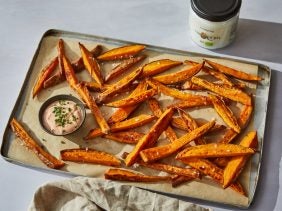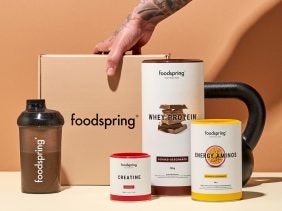Sunflower Seeds: Calories and Nutrition Benefits
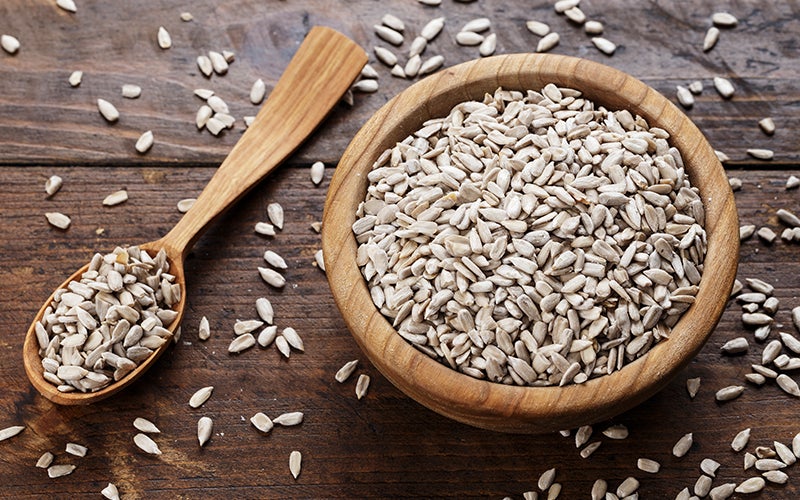 ©Sanny11
©Sanny11
Don’t underestimate the power in sunflower seeds. They may be small, but when it comes to nutrients, they’re actually giants. Read on for all the important facts about these protein-packed wonders and their health benefits.
Sunflower Seeds Calories and Nutritional Values
Sunflower seeds are much more than just birdseed. These small seed kernels have also been a favorite snack for humans for a while now, winning us over with their taste and nutrition. Another plus point: These tiny power packs are pretty inexpensive, which is why they sometimes end up in muesli as a substitute for more expensive nuts.
Did you know that sunflower seeds are good sources of protein? There’s more protein hidden in 100 grams than in some kinds of meat and fish. No wonder vegans and vegetarians are all about this little gem!
Our tip: On the subject of protein – if you want to treat yourself to a perfect serving of protein for in-between meals, our Vegan Protein Powder is a great choice. It’s a wonderful complement to your sunflower seed snack, packing a powerful punch of plant protein for both post workout and your everyday life. And that’s what helps you tap into your muscles’ full potential. Want to try it out first? Go for our trial size!
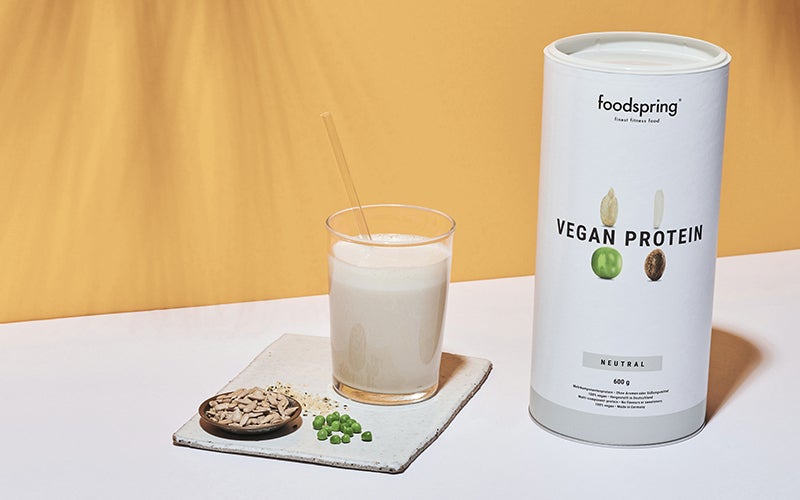
Take a look at the overview in our nutrition facts table and find out what else lies in these kernels:
100 grams of sunflower seeds
| Calories | 584 kcal |
| Protein | 21g |
| Carbohydrates | 20g |
| Fiber | 9g |
| Sugar | 2.6g |
| Fat | 51g |
| Saturated fat | 4.5g |
| Polyunsaturated fat
Monounsaturated fat | 23g 19g |
Are Sunflower Seeds Good For You?
Sunflower seeds might be small, but they are mighty. Despite their size, they contain a lot of healthy elements. Their phytosterols, which are secondary plant substances, are particularly significant, because they’re known to have an influence on various metabolic processes in the human body.
So why are sunflower seeds the healthy choice? According to epidemiological studies, the phytosterols abundant in sunflower seeds are able to lower your cholesterol level slightly1.
If you take a closer look at the inner life of sunflower seeds, you’ll notice many things that are good for you. For example, they’re rich in thiamine, perhaps better known as vitamin B1.
This water-soluble vitamin is important because it’s a building block of certain enzymes that control the metabolism of carbs and amino acids. According to the NHS, thiamine is also important for turning food into energy and is even involved in the transmission of stimuli in the nervous system2.
Sunflower seed kernels are also a good source3 of vitamin E, which helps keep your skin and eyes healthy. Your immune system, your body’s defenses against viruses and harmful bacteria, is also strengthened with vitamin E4.
Sunflower seeds also contain many other vitamins and dietary fiber, have a high folic acid content and plenty of calcium, iron, and magnesium, which is very important for nerve and muscle function.
Sunflower Seeds Contain These Healthy Fats
Their consistency may not give this away, but sunflower seeds are quite rich in fat. While a small proportion of these are saturated fats, the majority are mono- and polyunsaturated fats, which are known as healthy fats.
Their health benefits include protecting your heart and blood vessels. After all, according to the NHS, polyunsaturated fats can help reduce your levels of harmful LDL cholesterol5.
And another important detail: Sunflower seeds are high in omega-6 fatty acids. However, it’s important that these don’t become a huge part of your diet: the recommended ratio of omega-6 to omega-3 fatty acids is 5:16.
Are Sunflower Seeds Appropriate for Losing Weight?
Sunflower seeds’ total fat and calories might set off some alarms for your weight-loss plan, but they are indeed also suitable for weight loss. If you’re paying attention to your figure or want to lose a few kilos, include them – in moderate amounts. You shouldn’t be eating more than a handful of sunflower seeds a day – that’s just 28g per serving.
Why are these tiny power packs good fitness food? The large percentage of high-quality protein and unsaturated fats is one of the reasons. Fat keeps you full over a long period of time and can therefore help you eat less overall. And one more piece of good news: healthy fats can help you not only lose weight, but also define your muscles.
Our tip: Want to build muscles, but still not sure how? Then check out our Muscle Building Guide! With this highly-efficient 12-week program, as well as uncomplicated recipes and workouts, your goal is finally within reach.
Tips: How To Use Sunflower Seeds
A cozy evening of television tempting you to reach for some chips? Instead of unhealthy snacks, go for a small serving of sunflower seed kernels, and enjoy their mild, nutty taste. Not quite convinced? Then try our Protein Bars 12-pack mixed box instead! It’s a perfect selection of our delicious bars in different flavors. Now that’s some smart snacking!
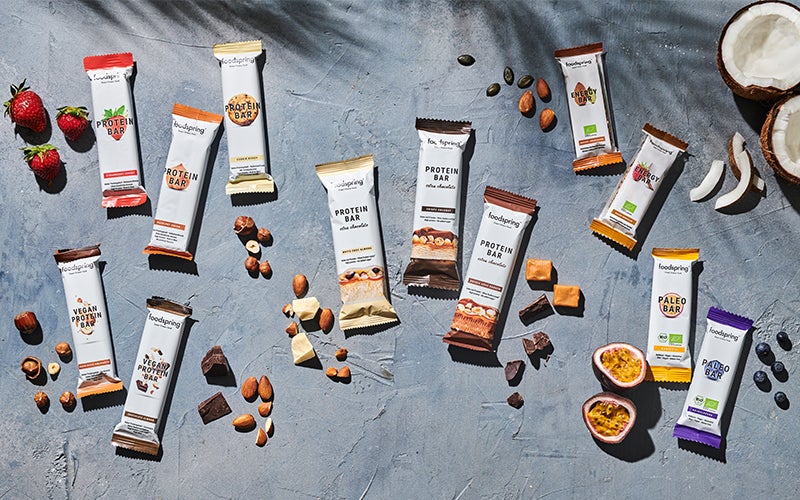
But back to the sunflower seeds. If you’re not a fan of eating them by themselves, you can also use them to add nutrition and crunch to, for example, breakfast cereals or a salad. To intensify their flavor, you can roast them lightly in a non-stick pan.
Check out our recipe for salad with chicken breast or tofu. Garnish this light lunch with some dry roasted sunflower seeds for an additional toasty aroma.
Sunflower seeds go well with both sweet and savory dishes. Let your imagination run wild in the kitchen and add these little powerhouses to your avocado toast, soup, vegetable stir-fry, casserole, cake, or pizza dough.
Want some inspiration? Check out our recipe for a fried egg avocado! It’s already packed with healthy fats – and if you top it off with sunflower seeds, you’ll add even more vitamins and a bit of crunch. Click here for the recipe.
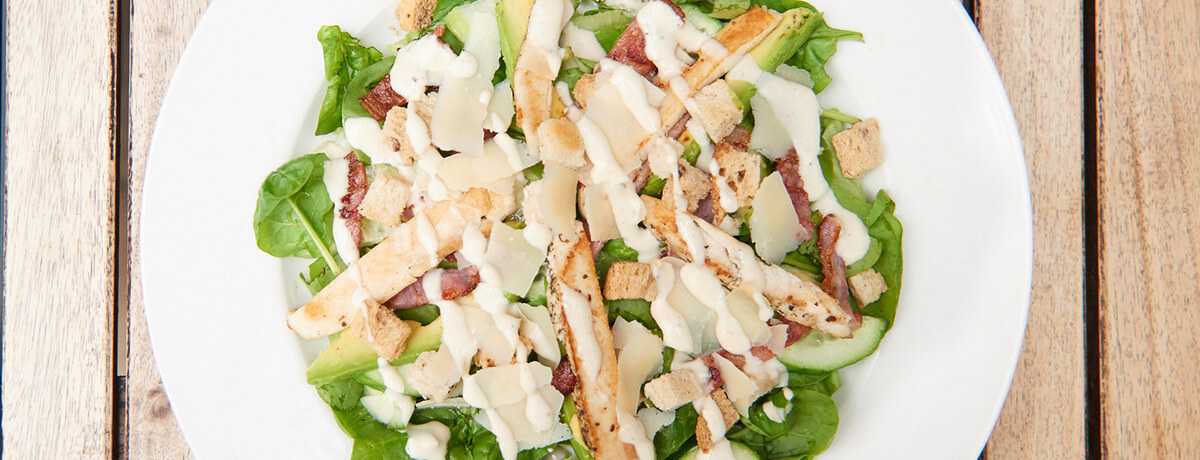
Sunflower Seeds: Conclusion
- Sunflower seeds may be small, but they’re packed with important nutrients and fiber.
- They have healthy fats to help protect your heart and blood vessels.
- These tiny high-protein wonders are a great way for vegetarians and vegans to meet their daily protein needs.
- You can eat sunflower seed kernels on their own or use them to give a nutty flavor to sweet and savory dishes.
Sources for this article
We at foodspring use only high-quality sources, including peer-reviewed studies, to support the facts within our articles. Read our editorial policy to learn more about how we fact-check and keep our content accurate, reliable, and trustworthy.
- 1 https://www.healthline.com/nutrition/phytosterols-good-or-bad#heart-health
- 2 https://www.nhs.uk/conditions/vitamins-and-minerals/vitamin-b/
- 3 https://time.com/5416869/are-sunflower-seeds-healthy/
- 4 https://www.nhs.uk/conditions/vitamins-and-minerals/vitamin-e/
- 5 https://www.nhs.uk/live-well/eat-well/different-fats-nutrition/
- 6 https://www.diabetes.co.uk/news/2016/oct/balanced-omega-6-to-omega-3-is-important-for-the-prevention-of-obesity,-evidence-suggests-92869028.html



















